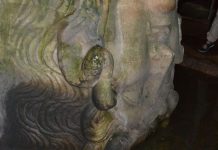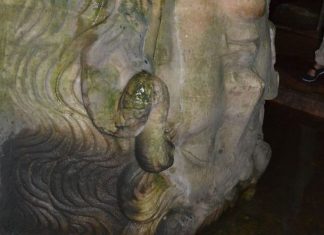The emperor and his court were deliberating as to whether it would be better for them if they remained or if they took to flight in the ships. And many opinions were expressed favouring either course. And the Empress Theodora also spoke to the following effect: “My opinion then is that the present time, above all others, is inopportune for flight, even though it bring safety. . . .
For one who has been an emperor it is unendurable to be a fugitive. May I never be separated from this purple, and may I not live that day on which those who meet me shall not address me as mistress. If, now, it is your wish to save yourself, O Emperor, there is no difficulty. For we have much money, and there is the sea, here the boats.
However consider whether it will not come about after you have been saved that you would gladly exchange that safety for death. For as for myself, I approve a certain ancient saying that royalty is a good burial-shroud.” When the queen had spoken thus, all were filled with boldness, and, turning their thoughts towards resistance, they began to consider how they might be able to defend themselves if any hostile force should come against them. . . .
All the hopes of the emperor were centred upon Belisarius and Mundus, of whom the former, Belisarius, had recently returned from the Persian war bringing with him a following which was both powerful and imposing, and in particular he had a great number of spearmen and guards who bad received their training in battles and the perils of warfare. . . .
When Hypatius reached the hippodrome, he went up immediately to where the emperor is accustomed to take his place and seated himself on the royal throne from which the emperor was always accustomed to view the equestrian and athletic contests. And from the palace Mundus went out through the gate which, from the circling descent, has been given the name of the Snail. . . . Belisarius, with difficulty and not without danger and great exertion, made his way over ground covered by ruins and half-burned buildings, and ascended to the stadium. . . .
Concluding that he must go against the populace who had taken their stand in the hippodrome-a vast multitude crowding each other in great disorder-he drew his sword from its sheatb and, commanding the others to do likewise, with a shout be advanced upon them at a run. But the populace, who were standing in a mass and not in order, at the sight of armoured soldiers who had a great reputatation for bravery and experience in war, and seeing that they struck out with their swords unsparingly, beat a hasty retreat. . . .
Partisans of Hypatius
[Mundus] straightway made a sally into the hippodrome through the entrance which they call the Gate of Death. Then indeed from both sides the partisans of Hypatius were assailed with might and main and destroyed. . . . There perished among the populace on that day more than thirty thousand. . . . The soldiers killed both [Hypatius and Pompeius] on the following day and threw bodies into the sea. . . . This was the end of the insurrection in Byzantium.
Read More about St. Theophanes








